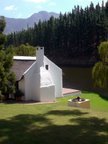
South Africa is a really long way from my home. So far that in spite of having nothing bad to say about my visit, I may wait a few years before I go back. Which might be a mistake: I felt change in the air in Cape Town, the wonderful vibrancy of the place causing the world to rush in and (maybe) wash away its distinct character. It will be hard to overwhelm the panorama of outsized mountain and ocean that stayed in front of me for most of my travel in the Western Cape. Everything it so grand, raw, and in many instances overwhelmingly majestic. Life buzzed on a cellular organic level for me during much of my trip; I felt connected of the corporeal world in a very positive way. Were we standing on the edge of the matrix? From two feet outside of the airport terminal until my return to Amsterdam I remained aware of being in Africa. It felt distinct in a very happy way.
The incautious tourist burns through film at a sprint while traveling along the rural roads in this southern tip of Africa; it's hard not to stop and document every twist and turn, as day after day you believe you may never see another vista so beautiful.
In spite of economic, political and cultural obstacles ahead and behind, it's hard not to see the residents of Western South Africa as lucky to be born in this place. It's dangerous to attempt a definition of national character based on seven days surrounded by a few dozen locals, but speaking in stereotypes I'd say South Africans have a combination of traits that will make them up to the tasks ahead for their nation. The prevailing attitude was such a breath of fresh air. Not naive, but earnest and positive. At once more formal than I'm accustomed to, and still irreverent/grounded in what's important. They seem freer, determined to live the individualism that our country's mythology pays lip service to. I visited a lot of farms and wineries in my week away, had lunch and dinner and conversation with the South Africans who ran them, saw snapshots of their reality. Below (and in at least a few posts to follow) I will attempt to capture a fragment of these lives.
Leeuwenkuil farm is deeper into the interior than we'd gone on our first day in Africa. It was strangely refreshing to move away from the cinematic sweep of the ocean and see burnished rolling countryside, hills and distant mountains that were less otherworldly. It gave my inner tourist a repite from the adrenaline-fueled exhileration of the coast, and comfortingly matched my mental picture of the viticultural heart of South Africa. At midday we arrived at Mr. Dreir's farm, a dusty whitewashed cluster of buildings set in a sea of arable green. Standing on their doorstep you become aware of how rare it is to look to the horizon and see no mark of humanity more obtrusive than agricultural symmetry. Maybe a phone line. Mr. Dreir's forefathers were deeded this land in 1693, and began farming it in 1705. In the 18th century they were sheep and cereal farmers. Now they farm 2,000 acres including Chenin, Pinotage, Shiraz, others. The Africaaner accents are thicker here: in a quiet matter-of-fact way one can sense the family's commitment to quality farming methods. The wines are made in a modern, clean way, utilizing basics like temperature-control and more techniques developed from experience in this distinct mesoclimate, like early pressing of the Pinotage to minimize bitterness from excessive skin contact. They harvest and vinify parcels separately utilizing information from heat-sensitive aereal photographs. Amazingly, given the size of this place (it includes the largest single Pinotage vineyard in the world)most of the harvesting is by hand. The soil is right for grapes, primarily composed of Malmsbury shale soil that keeps the right amount of moisture available to vine roots.
Leeuwenkuil means Lion pool. Today small bucks and birds of prey are the wildlife one is likely to see. As I stood at the top of a gently sloping hill and munched on Cinsalt and Shiraz berries I could see Perdeberg (horse)mountain, so named because a breed of now-extinct zebra-like horse used to roam this terrain.
I promise post the next installment of this wine-fueled travellogue quite soon. For now, the world of wine retail beckons. Maybe I'll sell some Pinotage today. . . .

3 Comments:
Hi Jay -- I can't see Leeuwenkuil listed in Platter. What name do they sell their wines under? I'm interested in the largest Pinotage vineyard' angle.
Leeuwenkuil is the largest contributor (of five) to the Man Vintners Cooperative. Their wines are widely available and reasonably priced.
Hi Peter and Jay
This mentioned Pinotage vineyard is 62ha big, dryland, bushvines. It's the biggest vineyard in South Africa and the biggest Pinotage block in the world.
Please contact me for more info at
pieter@leeuwenkuilfv.co.za
Post a Comment
<< Home